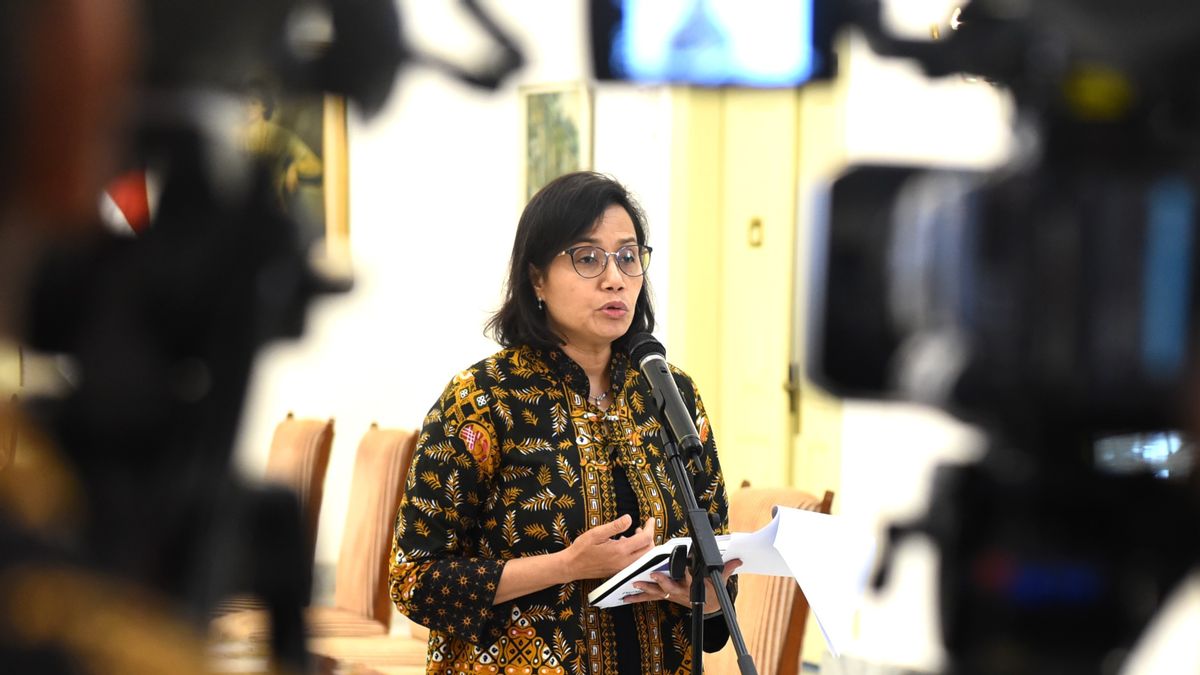JAKARTA - The government and Bank Indonesia (BI) have agreed to share the burden or 'burden sharing' in financing for handling and economic recovery due to the COVID-19 pandemic. There are three burden sharing schemes proposed by the Ministry of Finance and BI.
The government has widened the 2020 state budget deficit, from 1.76 percent of GDP to 6.34 percent to meet the financing needs for handling COVID-19 and for national economic recovery.
The scheme is outlined in the Second Joint Decree (SKB) between the Minister of Finance and the Governor of BI and the Cooperation Agreement (PKS) between the Director General of Financing and Risk Management of the Ministry of Finance and the Deputy Governor of BI.
Minister of Finance Sri Mulyani Indrawati said sharing the burden between the government and BI would be carried out prudently, implementing good governance, and being transparent and accountable.
Sri said the burden sharing scheme also adhered to several main principles, namely maintaining fiscal space and sustainability in the medium term, maintaining the quality of the state budget deficit aimed at productive spending and supporting the gradual reduction of the APBN deficit to below 3 percent starting in 2023.
"The government understands that the deficit has increased tremendously, of course it creates enormous pressure on the fiscal. On the other hand, the global and domestic securities markets are experiencing turmoil due to COVID-19. Therefore, the government together with BI have agreed that there is a burden sharing mechanism that can be properly accounted for. "he said in a virtual press conference, Monday, July 6.
Furthermore, Sri explained, the implementation of the burden sharing scheme is not new and is not only done by Indonesia. This scheme is also implemented by several other countries, such as the UK, Japan, the United States, the European Union and Thailand.
According to Sri Mulyani, these countries were proven to be able to maintain inflation and exchange rates despite using this burden sharing scheme.
Three Schemes Proposed by the Ministry of Finance and BIThere are three burden sharing schemes proposed by the Ministry of Finance and Bank Indonesia to deal with the impact of the COVID-19 pandemic. There are two burdens that will be borne by the government and BI, namely the burden concerning the interests of the public (public goods) and the burden on MSMEs and non-UMKM corporations (non-public goods).
Sri Mulyani explained that the total burden for public goods reached IDR 397.5 trillion. It consists of Rp. 87.5 trillion for health spending, Rp. 203.9 trillion for social protection, and Rp. 106.1 trillion for sectoral ministries / agencies and local governments.
Then, the non-public goods expense of Rp.505.9 trillion, consisting of Rp.123.4 trillion for MSME financing, Rp.53.5 trillion for non-UMKM corporations, and Rp.328.8 trillion for other expenses.
The state treasurer said three different burden sharing schemes were applied according to each usage group. First, for public goods spending, the government issues government securities (SBN) directly to BI with the BI reverse repo rate (RRR) reference rate. SBN, he continued, is tradeable and marketable.
"The interest expense will be borne entirely by BI, so the burden on the government for SBN issued by the government's private placement is 0 percent, BI is the reverse repo rate," he said.
Then, secondly, for non-public goods, the government and BI agreed that the market interest rate would be divided in half. The government bears the amount of BI RRR minus 1 percent.
Finally, for other non-public goods, the government bears interest at the market rate.
Sri Mulyani explained that the issuance of SBN for the second and third burden sharing schemes was through market mechanisms, namely auctions, green shoe options and private placement. "Everything is done in accordance with the SKB (joint statement) of the Minister of Finance and the Governor of BI which was signed on April 16," he said.
The government, said Sri, would pay interest or yields to BI according to the SBN maturity date. Then, on the same day BI will return the yield to the government on the agreed burden sharing scheme.
Sri Mulyani explained, regarding burden sharing, the government and BI have implemented the principle of maintaining fiscal space in a sustainable manner in the medium term and gradually reducing the APBN deficit to below 3 percent starting in 2023.
Then, maintain the stability of the exchange rate, interest rates, and inflation; pay attention to credibility and integrity in fiscal-monetary management; as well as encouraging sustainable economic growth.
The English, Chinese, Japanese, Arabic, and French versions are automatically generated by the AI. So there may still be inaccuracies in translating, please always see Indonesian as our main language. (system supported by DigitalSiber.id)













